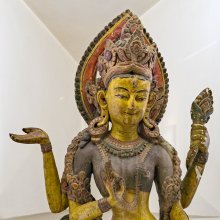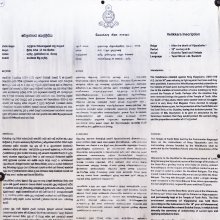Ga, Gā: 17 definitions
Introduction:
Ga means something in Hinduism, Sanskrit, the history of ancient India, Marathi, Jainism, Prakrit, Hindi, biology. If you want to know the exact meaning, history, etymology or English translation of this term then check out the descriptions on this page. Add your comment or reference to a book if you want to contribute to this summary article.
Images (photo gallery)
In Hinduism
Purana and Itihasa (epic history)
Source: Cologne Digital Sanskrit Dictionaries: The Purana Index1a) Gā (गा).—A daughter of Kākustha, and wife of Yati.*
- * Brahmāṇḍa-purāṇa III. 68. 13: Vāyu-purāṇa 93. 14.
1b) A name of Sarasvatī.*
- * Vāyu-purāṇa 23. 5, 55.

The Purana (पुराण, purāṇas) refers to Sanskrit literature preserving ancient India’s vast cultural history, including historical legends, religious ceremonies, various arts and sciences. The eighteen mahapuranas total over 400,000 shlokas (metrical couplets) and date to at least several centuries BCE.
Chandas (prosody, study of Sanskrit metres)
Source: Shodhganga: a concise history of Sanskrit Chanda literatureGa (ग) is a Sanskrit abbreviation for the guru letter.—The whole chanda literature has several technical terms, by which it is controlled. Single letters are used to denote a specific instance. The letter ga stands for guru letter while the letter la stands for laghu letter. In a verse the letter which is guru is also known as dīrgha (long) and which is laghu is also known as hrasva (short). The dīrgha letter consists of two mātrās while the hrasva letter consists of one mātrā.
Guru symbols can be identified as the shape of tāṭaṅka, hāra or keyūra, and the laghu can be identified as menu, kāhāla (daṇḍa) or śara.

Chandas (छन्दस्) refers to Sanskrit prosody and represents one of the six Vedangas (auxiliary disciplines belonging to the study of the Vedas). The science of prosody (chandas-shastra) focusses on the study of the poetic meters such as the commonly known twenty-six metres mentioned by Pingalas.
India history and geography
Source: Cologne Digital Sanskrit Dictionaries: Indian Epigraphical GlossaryGa.—(IE 8-1), used for gā (in Kharoṣṭhī) as an abbrevia- tion of gāthā; also abbreviation of gadyāṇa (q. v.). Note: ga is defined in the “Indian epigraphical glossary” as it can be found on ancient inscriptions commonly written in Sanskrit, Prakrit or Dravidian languages.
--- OR ---
Ga.—abbreviation of gadyāṇa. Note: ga is defined in the “Indian epigraphical glossary” as it can be found on ancient inscriptions commonly written in Sanskrit, Prakrit or Dravidian languages.

The history of India traces the identification of countries, villages, towns and other regions of India, as well as mythology, zoology, royal dynasties, rulers, tribes, local festivities and traditions and regional languages. Ancient India enjoyed religious freedom and encourages the path of Dharma, a concept common to Buddhism, Hinduism, and Jainism.
Biology (plants and animals)
Source: Google Books: CRC World Dictionary (Regional names)Ga in Senegal is the name of a plant defined with Pennisetum pedicellatum in various botanical sources. This page contains potential references in Ayurveda, modern medicine, and other folk traditions or local practices It has the synonym Eriochaeta reversa Fig. & De Not. (among others).
Example references for further research on medicinal uses or toxicity (see latin names for full list):
· Biol. Pl. (1982)
· Flora (1844)
· Österreichische Botanische Zeitschrift (1851)
· Conspectus Florae Africae (1894)
· Journal of the Asiatic Society of Bengal (1852)
· Botanical Journal of the Linnean Society (1979)
If you are looking for specific details regarding Ga, for example extract dosage, diet and recipes, health benefits, chemical composition, side effects, pregnancy safety, have a look at these references.

This sections includes definitions from the five kingdoms of living things: Animals, Plants, Fungi, Protists and Monera. It will include both the official binomial nomenclature (scientific names usually in Latin) as well as regional spellings and variants.
Languages of India and abroad
Marathi-English dictionary
Source: DDSA: The Molesworth Marathi and English Dictionaryga (ग).—The third consonant. It corresponds with G hard, as in Gum. 2 Being the first letter of garva Pride, it is used covertly for that word. Ex. tyālā gacī pīḍā phāra jhālī āhē.
--- OR ---
ga (ग).—a S That goes. In comp. as uraga That goes upon the breast, a serpent &c. 2 That has reached or is arrived at: also that is inherent or conversant in or amidst. Ex. bhumiga, buddhiga, khaga, jalaga.
--- OR ---
gā (गा).—ind See explained under agā ind.
Source: DDSA: The Aryabhusan school dictionary, Marathi-Englishga (ग).—The third consonant. a (In Comp.) That goes. That is inherent.
--- OR ---
gā (गा).—ind A vocative particle in calling to a male.
--- OR ---
ga (ग).—or-
--- OR ---
gā (गा).—or-
Marathi is an Indo-European language having over 70 million native speakers people in (predominantly) Maharashtra India. Marathi, like many other Indo-Aryan languages, evolved from early forms of Prakrit, which itself is a subset of Sanskrit, one of the most ancient languages of the world.
Sanskrit dictionary
Source: DDSA: The practical Sanskrit-English dictionaryGa (ग).—a. (Used only at the end of comp.) Who or what goes, going, moving, being, staying, remaining, having sexual intercourse with &c.; cf. Manusmṛti 4.12; Y.3.29; R.3.13.
-gaḥ 1 A Gandharva.
2) An epithet of Gaṇeśa.
3) A long syllable (used as an abbreviation of guru, in prosody).
4) Śiva.
5) Viṣṇu; cf. गः प्रीतो भवः श्रीपतिरुत्तमः (gaḥ prīto bhavaḥ śrīpatiruttamaḥ) Enm.
-gā, -gam A song; गं वादित्रं शरणं वरम् (gaṃ vāditraṃ śaraṇaṃ varam) | ibid.
--- OR ---
Ga (ग).—1 P. (gacchati, jagāma, agamat, gamiṣyati, gantum, gata desid.; jigamiṣati, jigāṃsate Ātm.; frequent jaṅgamyate; jaṅgamīti or jaṅganti)
1) To go, move in general; गच्छत्वार्या पुनर्दर्शनाय (gacchatvāryā punardarśanāya) V.5; गच्छति पुरः शरीरं धावति पश्चादसंस्तुतं चेतः (gacchati puraḥ śarīraṃ dhāvati paścādasaṃstutaṃ cetaḥ) Ś.1.33; क्वाधुना गम्यते (kvādhunā gamyate) 'where art thou going'.
2) To depart, go forth, go away, set forth or out; उत्क्षिप्यैनां ज्योतिरेकं जगाम (utkṣipyaināṃ jyotirekaṃ jagāma) Ś.5.3.
3) To go to, reach, resort to, arrive at, approach; यदगम्योऽपि गम्यते (yadagamyo'pi gamyate) Pañcatantra (Bombay) 1.7; एनो गच्छति कर्तारम् (eno gacchati kartāram) Manusmṛti 8.19 the sin goes to (recoils on) the doer; 4.199; so धरणिं मूर्ध्ना गम् (dharaṇiṃ mūrdhnā gam) &c.
4) To pass, pass away, elapse (as time); दिनेषु गच्छत्सु (dineṣu gacchatsu) R.3.8 as days rolled on, in course of time; Meghadūta 85; काव्यशास्त्रविनोदेन कालो गच्छति धीमताम् (kāvyaśāstravinodena kālo gacchati dhīmatām) H.1.1; गच्छता कालेन (gacchatā kālena) in the long run.
5) To go to the state or condition of, become, undergo, suffer, partake of &c. (usually joined with nouns ending in. -tā, -tva &c, or any noun in the acc.); गमिष्या- म्युपहास्यताम् (gamiṣyā- myupahāsyatām) R.1.3; पश्चादुमाख्यां सुमुखी जगाम (paścādumākhyāṃ sumukhī jagāma) Kumārasambhava 1.26 went by or received the name of Umā; so तृप्तिं गच्छति (tṛptiṃ gacchati) becomes satisfied; विषादं गतः (viṣādaṃ gataḥ) became dejected; कोपं न गच्छति (kopaṃ na gacchati) does not become angry; आनृण्यं गतः (ānṛṇyaṃ gataḥ) became released from debt; मनसा गम् (manasā gam) to think of, remember; Kumārasambhava 2.63; वृषेण गच्छतः (vṛṣeṇa gacchataḥ) riding a bull; Kumārasambhava 5.8.
6) To cohabit, have sexual intercourse with; गुरोः सुतां (guroḥ sutāṃ) ... यो गच्छति पुमान् (yo gacchati pumān) Pañcatantra (Bombay) 2.17; Y.1.8. -Caus. (gamayati-te)
1) To cause to go, lead or reduce to (as a state); गमितः गतिम् (gamitaḥ gatim) Kumārasambhava 4.24; Bhartṛhari 3.38; Kirātārjunīya 2.7.
2) To spend, pass (as time).
3) To make clear, explain, expound.
4) To signify, denote, convey an idea or sense of; द्वौ नञौ प्रकृतार्थ गमयतः (dvau nañau prakṛtārtha gamayataḥ) 'two negatives make one affirmative'.
5) To send to.
6) To bring to a place (acc.).
7) To impart, grant, bestow.
8) To intend, mean.
Derivable forms: gam (गम्).
--- OR ---
Gā (गा).—1 or 2 Ā, 3 P. (gāte, jigāti)
1) To go, see इ (i). etc.
2) To come to any state or condition.
3) To praise, sing.
--- OR ---
Gā (गा).—A song, verse. 'गा क्ष्मोमा च रमा (gā kṣmomā ca ramā) |' Enm.
Source: Cologne Digital Sanskrit Dictionaries: Shabda-Sagara Sanskrit-English DictionaryGa (ग).—The third consonant of the Nagri alphabet, the letter G.
--- OR ---
Ga (ग).—mfn.
(-gaḥ-gā-gaṃ) Who or what goes, used chiefly in composition: as adhvagaḥ a traveller, who goes a road; apagā what goes down, (a river, &c.) m.
(-gaḥ) 1. A name of the deity Ganesha. 2. A Gandharba or celestial musician. f.
(-gā) A song. n.
(-gaṃ) Song, singing. E. gam to go or gai to sing, affix ḍa, fem. affix ṭāp.
--- OR ---
Gā (गा).—r. 1st cl. (ṅa) gāṅ (gāte) To go, to go to or towards. r. 3rd. cl. but restricted to the Vedas. (jagāti) To praise.
--- OR ---
Gā (गा).—f.
(-gā) A verse or metrical composition. E. gai to sing, ka and ṭāp affixes: see ga.
Source: Cologne Digital Sanskrit Dictionaries: Benfey Sanskrit-English DictionaryGa (ग).—[-ga] (vb. gam), latter part of comp. words. 1. Moving, going, e. g. śīghra-, adj. Going quickly, [Rāmāyaṇa] 3, 31, 3. 2. Being, e. g. kūpa-ga, adj. Being in a pit, [Kathāsaritsāgara, (ed. Brockhaus.)] 4, 128. 3. Referring to, e. g. rāghavānuja-, adj. Referring to the younger brother of Rāma, [Rāmāyaṇa] 6, 70, 59.
--- OR ---
Ga (ग).—[-ga] (vb. gai), latter part of comp. words. Singing.
— Cf. chandoga.
--- OR ---
Gā (गा).—† i. 1. [Ātmanepada.]; ved. ii. 2 and 3, jigā (in classic writings only the Aor. [Parasmaipada.] [Ātmanepada.]). 1. To go, [Bhāgavata-Purāṇa, (ed. Burnouf.)] 1, 13, 1. 2. To come, [Bhāgavata-Purāṇa, (ed. Burnouf.)] 3, 18, 27. 3. To undergo (cf. gam); harṣam, To become glad, [Rāmāyaṇa] 5, 91, 25. Desider. jigīṣa, To desire to go, [Bhāgavata-Purāṇa, (ed. Burnouf.)] 2, 10, 25.
— With the prep. ati ati, 1. To cross, [Rāmāyaṇa] 2, 52, 75. 2. To pass, [Arjunasamāgama] 4, 62. 3. To die, [Rāmāyaṇa] 2, 72, 29. 4. To escape, [Bhāgavata-Purāṇa, (ed. Burnouf.)] 4, 21, 56. 5. To subdue, [Bhāgavata-Purāṇa, (ed. Burnouf.)] 9, 20, 27. 6. To neglect, Mahābhārata 5, 4212.
— With vyati vi-ati, To pass, [Raghuvaṃśa, (ed. Stenzler.)] 6, 52.
— With adhi adhi, 1. To undergo; śramam, To become tired, [Bhāgavata-Purāṇa, (ed. Burnouf.)] 4, 26, 10. 2. To think of, [Nala] 10, 16. 3. usually [Ātmanepada.], To study, to learn, to read, Mahābhārata 1, 5106; 13, 121; [Mānavadharmaśāstra] 1, 59; [Bhāgavata-Purāṇa, (ed. Burnouf.)] 9, 22, 23.
— With anu anu, To follow, Mahābhārata 3, 2303.
— With samanu sam-anu, To follow, Mahābhārata 5, 432.
— With abhi abhi, 1. To go to, [Rāmāyaṇa] 1, 63, 3. 2. To approach, [Rāmāyaṇa] 1, 20, 2. 3. To undergo, to attain, Mahābhārata 3, 16625.
— With ā ā, 1. To approach, Mahābhārata 1, 3573. 2. To befall, Mahābhārata 3, 1355.
— With abhyā abhi-ā 1. To approach, [Bhāgavata-Purāṇa, (ed. Burnouf.)] 9, 21, 10. 2. To befall, Mahābhārata 3, 1120. 3. To resolve (with infin.), [Mānavadharmaśāstra] 10, 108.
— With samabhyā sam-abhi-ā, To approach, Mahābhārata 1, 5328. 2. To befall, Mahābhārata 2, 2597.
— With upā upa-ā, To approach, [Kathāsaritsāgara, (ed. Brockhaus.)] 5, 68.
— With paryā, To expire, Mahābhārata 12, 8157.
— With ni ni, To nestle, Mahābhārata 6, 1886.
— With nis nis, To go out, [Kathāsaritsāgara, (ed. Brockhaus.)] 18, 83.
— With pari pari, 1. To move round, [Rāmāyaṇa] 2, 96, 45. 2. To befall, Mahābhārata 1, 3647. 3. To mistake, to know not, [Bhāgavata-Purāṇa, (ed. Burnouf.)] 2, 6, 35.
— With anupari anu-pari, To walk over, Mahābhārata 12, 8081.
— With pra pra, To proceed, Mahābhārata 6, 2212.
— With prati prati, To return, [Bhāgavata-Purāṇa, (ed. Burnouf.)] 4, 20, 37.
— With sam sam, To go to, [Bhāgavata-Purāṇa, (ed. Burnouf.)] 9, 24, 66.
— Cf. (= agām), perhaps [Latin] navi-gare.
Source: Cologne Digital Sanskrit Dictionaries: Cappeller Sanskrit-English DictionaryGa (ग).—[adjective] going in or to, situate or being in, referring to (—°).
--- OR ---
Gā (गा).—1. jigāti go, move, come, approach, repair to ([accusative] or [locative]); follow, persecute; undergo, incur, obtain.
--- OR ---
Gā (गा).—2. gāyati (gāyate) & gāti [participle] gīta (q.v.) sing, chant, recite, praise, proclaim; [Passive] also be called, have the name of ([nominative]). [Causative] gāpayati. [Intensive] jegīyate ([with] act. & pass. [meaning]).
Source: Cologne Digital Sanskrit Dictionaries: Monier-Williams Sanskrit-English Dictionary1) Ga (ग):—1. ga (3rd consonant of the alphabet), the soft guttural having the sound g in give
2) m. Name of Gaṇeśa, [cf. Lexicographers, esp. such as amarasiṃha, halāyudha, hemacandra, etc.]
3) 2. ga mf(ā)n. (√gam) only ifc. going, moving (e.g. yāna-, going in a carriage, [Manu-smṛti iv, 120; Yājñavalkya iii, 291]; śīghra-, going quickly, [Rāmāyaṇa iii, 31, 3]; cf. antarikṣaetc.)
4) having sexual intercourse with (cf. anya-strī-)
5) reaching to (cf. kaṇṭha-)
6) staying, being, abiding in [Varāha-mihira’s Bṛhajjātaka; Raghuvaṃśa iii, 13; Kathāsaritsāgara] etc. (e.g. pañcama-, abiding in or keeping the fifth place, [Śrutabodha])
7) relating to or standing in connection with, [Rāmāyaṇa vi, 70, 59; Bhāgavata-purāṇa etc.] (cf. a-, agra-, a-jihma-, atyanta-, etc.; agre-ga, etc.)
8) 3. ga mf(ī[Pāṇini 3-2, 8])n. (√gai) only ifc. singing (cf. chando-, purāṇa-, sāma-)
9) m. a Gandharva or celestial musician, [cf. Lexicographers, esp. such as amarasiṃha, halāyudha, hemacandra, etc.]
10) Gā (गा):—[from ga] a f. a song, [cf. Lexicographers, esp. such as amarasiṃha, halāyudha, hemacandra, etc.]
11) Ga (ग):—n. idem, [cf. Lexicographers, esp. such as amarasiṃha, halāyudha, hemacandra, etc.]
12) 4. ga (used in works on prosody as an abbreviation of the word guru to denote) a long syllable, [Horace H. Wilson]
13) (in music used as an abbreviation of the word gāndhāra to denote) the third note.
14) Gā (गा):—1. gā [class] 3. [Parasmaipada] jigāti ([Ṛg-veda]; jagāti, [Naighaṇṭuka, commented on by Yāska ii, 14] ([varia lectio]); [subjunctive] jigāt; [imperative] jigātu; [Aorist] agāt; 3. [plural] agan, [Bhāgavata-purāṇa i, 9, 40]; [subjunctive] [1. sg. geṣam See anuand upa-], 2. sg. gās, 3. sg. gāt, 2. [plural] gāta, 3. [plural] gur; perf. jigāya See ud-, perf. [Potential] jagāyāt [Naighaṇṭuka, commented on by Yāska ii, 14] [Ṛg-veda x, 28, 1]; [infinitive mood] gātave, [Ṛg-veda ii, 3, 1]; in Class. Sanskṛt only the [Aorist] [Parasmaipada] agāt occurs, for [Ātmanepada] See adhi-; [Aorist] [Passive voice] agāyi, agāsātām, [Kāśikā-vṛtti on Pāṇini 2-4, 45 and 77]; [class] 2. [Parasmaipada] gāti, [Naighaṇṭuka, commented on by Yāska ii, 14]; [Ātmanepada] gāte, [Dhātupāṭha xx, 53])
—to go, go towards, come, approach (with [accusative] or [locative case]), [Ṛg-veda; Atharva-veda] etc.;
—to go after, pursue, [Ṛg-veda iv, 3, 13; x, 18, 4];
—to fall to one’s ([dative case]) share, be one’s ([accusative]) due, [viii, 45, 32; Raghuvaṃśa xi, 73];
—to come into any state or condition ([accusative]), undergo, obtain, [Mahābhārata iii, 10697; Rāmāyaṇa] etc.;
—to go away (from [ablative]; to any place [locative case]), [Ṛg-veda x, 108, 9];
—to come to an end, [Naiṣadha-carita viii, 109];
—to walk (on a path [accusative] or [instrumental case]), [Ṛg-veda viii, 2, 39 and 5, 39];
— (jigāti) to be born, [Vopadeva on Dhātupāṭha xxv, 25] :—[Desiderative] jigīṣati, to desire to go, [Bhāgavata-purāṇa ii, 10, 25];
15) cf. βίβημι, ἔβην; Old [German] gām, gās, etc.; [Gothic] ga-tvo; [English] go.
16) 2. gā mfn. [Vedic or Veda] ifc. ‘going’ (cf. a-gā; agre-,tamo-,puro-,samanaand svasti-gā), [Pāṇini 3-2, 67.]
17) 3. gā mfn. (√gai) ifc. ‘singing’ See sāma-gā
18) f. See sub voce 3. ga.
Source: Cologne Digital Sanskrit Dictionaries: Yates Sanskrit-English Dictionary1) Ga (ग):—The letter g, the 3rd consonant of the Alphabet.
2) (gaḥ) 1. m. A name of the deity Ganesh; a celestial musician. f. (gā) A song. n. Song. a. Going, as padga going on foot, a foot soldier.
3) Gā (गा):—[(-ṅa) gāte] 1. d. To go. (li) jagāti 3rd restricted to the Vedas.
4) (gā) 1. f. A verse.
[Sanskrit to German]
Sanskrit, also spelled संस्कृतम् (saṃskṛtam), is an ancient language of India commonly seen as the grandmother of the Indo-European language family (even English!). Closely allied with Prakrit and Pali, Sanskrit is more exhaustive in both grammar and terms and has the most extensive collection of literature in the world, greatly surpassing its sister-languages Greek and Latin.
Hindi dictionary
Source: DDSA: A practical Hindi-English dictionaryGa (ग) [Also spelled g]:——the third consonant and the third member of the first pentad (i.e.[kavarga]) of the Devnagri: alphabet; a Sanskirt suffix denoting a mover (as [khaga]).
...
Prakrit-English dictionary
Source: DDSA: Paia-sadda-mahannavo; a comprehensive Prakrit Hindi dictionaryGā (गा) in the Prakrit language is related to the Sanskrit word: Gau.
Gā has the following synonyms: Gāa.
Prakrit is an ancient language closely associated with both Pali and Sanskrit. Jain literature is often composed in this language or sub-dialects, such as the Agamas and their commentaries which are written in Ardhamagadhi and Maharashtri Prakrit. The earliest extant texts can be dated to as early as the 4th century BCE although core portions might be older.
Kannada-English dictionary
Source: Alar: Kannada-English corpusGa (ಗ):—[noun] (gen. pronounced with the vowel 'a') the seventeenth letter of Kannaḍa alphabet and the third consonant.
--- OR ---
Ga (ಗ):—
1) [noun] (pros.) the symbol for a long syllable (-).
2) [noun] the third note in the ascending scale in Indian classical music systems (corresponding to "E" of C-Major of western system).
3) [noun] an abbreviation used (in inscriptions) as a symbol for "gadyāṇa' , an ancient monetary currency.
4) [noun] (dial.) arrogance; conceit; haughtiness; ಶ್ರೀ ಒಣಗಿದೆ ಗ ಬಚ್ಚಿದೆ [shri onagide ga baccide] sri oṇagide, ga baccide (prov.) (his) arrogance has become less severe as his wealth waned.
Kannada is a Dravidian language (as opposed to the Indo-European language family) mainly spoken in the southwestern region of India.
See also (Relevant definitions)
Starts with (+9811): Bamkana, Ga bra i rtsa ba, Ga brai rtsa ba, Ga bu ra, Ga bur, Ga ndha pri yam ku, Ga pushpasaurabha, Ga-dur, Ga-mene-mene, Ga-nak, Ga-ndyal, Ga-nyangigany, Ga-tyak, Gaa, Gaa, Gaa, Gaab, Gaaba, Gaabbe, Gaaboli.
Ends with (+9980): A pa ma rga, A rga, A-pa-ma-rga, Aaga, Abahirbhoga, Abalaga, Abashairanga, Abasiga, Abbaliga, Abbariga, Abbashai-ranga, Abbhamga, Abbhamga, Abbhantara Vagga, Abbhiga, Abbhimga, Abbhokasik Anga, Abbhokasikanga, Abdaprayoga, Abdapurtiprayoga.
Full-text (+3081): Antaga, Anuga, Aga, Kamaga, Nicaga, Apaga, Ashuga, Kanthaga, Vasaga, Agrega, Samipaga, Upaga, Nimnaga, Mahaga, Duraga, Shighraga, Dirghadhvaga, Urddhvaga, Madhyaga, Viduraga.
Relevant text
One of your search terms exceeds the minimun character amount per search term. This amount currently equals 2.
No search results for Ga, Gā in any book or story.
Related products


